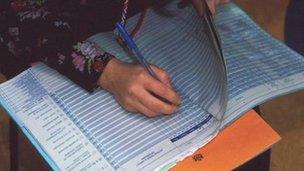Scotland's teacher training places to increase
- Published

Mr Russell wants 300 extra teachers to be trained
The Scottish government's Education Secretary Mike Russell has recommended a rise in the number of teacher training places.
Teaching unions have questioned the move, saying the majority of newly qualified teachers did not have long-term work.
The latest figures indicated that only 16% of those who qualified this summer had full time permanent jobs.
Mr Russell said a projected rise in teacher demand had prompted the move.
The minister will recommend to the Scottish Funding Council that universities should increase the number of student teachers in 2012/13, ready to join the teaching workforce as probationer teachers in 2013.
He believed 100 extra secondary teachers were needed and 200 extra primary teachers were needed.
Mr Russell pointed to the fact that pupil numbers in primary schools had increased in 2011 and would continue to increase each year, peaking in 2018.
He said that trend should be considered alongside the improved Jobseeker Allowance (JSA) claimant figures for teachers which showed that over the last 12 months the number of teachers claiming had fallen by 29%.
Following the announcement, Mr Russell said: "Having closely examined with partners a range of factors that influence decisions about teacher supply I believe there is compelling evidence that the situation is now such that we should increase the number of teachers being trained.
"We are taking a measured approach and will continue to monitor the situation to provide necessary stability and smooth out the boom and bust management of teacher recruitment that we have seen in Scotland over recent decades.
"Along with a recommendation to train 200 more primary teachers and 100 more secondary teachers, we are seeking to encourage those that have sought work outside of teaching back into the profession. We will also look carefully at the secondary subject prioritisation, particularly in relation to foreign languages and computing."
'Boom and bust'
Ann Ballinger general secretary of the Scottish Secondary Teachers' Association said she was "staggered" by Mr Russell's recommendation.
She added: "I welcome any move away from boom and bust but it concerns me that only 16% of new teachers have full time permanent jobs. They have given up four years of their lives. We cannot ask young people give up more lucrative careers if we don't have jobs for them."
Jane Peckham, the Scotland organiser of the NASUWT union, described the job outlook for teachers in Scotland as "shocking".
Ronnie Smith, general secretary of the Educational Institute of Scotland, said the government continued to address only the supply side through the "training of more teachers and not the demand side where local authorities had been employing fewer teachers in recent years".
Labour's education spokesman Hugh Henry claimed the SNP had cut teacher numbers every year since it had come to power.
He added: "This is the same SNP government that a few years ago actually cut the number of teachers being trained. At the same time it cut the number of teachers employed in Scotland and caused a real crisis for those looking for employment with over 80% of newly-qualified teachers now not in full-time permanent jobs."
Scottish Conservative Education spokeswoman, Liz Smith, said she was concerned about the kind of subjects teachers were being trained in.
She added: "We are witnessing serious concerns about whether we are training sufficient teachers of modern languages, of religious and moral education and of PE to name just a few. There is also the very important issue of how costs will be met amongst local authorities."
Scottish Liberal Democrat education spokesman Liam McArthur said the SNP's track record on teacher training "was poor".
He added: "Even the education minister admits to having lost sleep in the past over his failure to deliver teaching opportunities for those completing their training in Scotland.
"Regardless of the spin, figures published earlier this month show that only one in five newly-qualified teachers are finding full-time employment. This figure is still far too low. It is in that context that today's announcement from Mr Russell will be met with a guarded welcome."
- Published7 December 2011
- Published30 October 2011
- Published15 June 2011
- Published8 December 2010
- Published1 December 2010
- Published15 September 2010
- Published14 September 2010
- Published16 August 2010
- Published2 June 2010